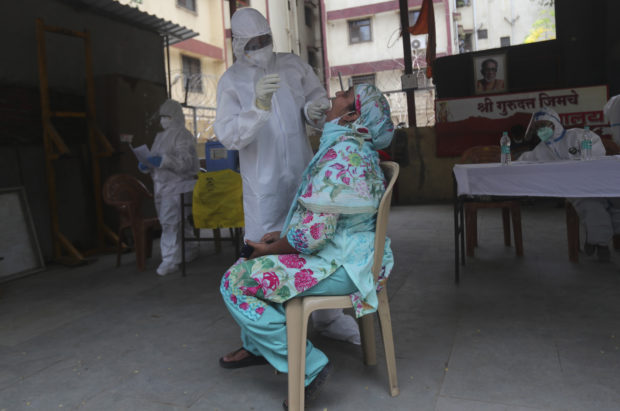
A health worker takes a swab test of a woman during a free medical checkup in Dharavi, one of Asia’s biggest slums, in Mumbai, India, Friday, June 26, 2020. India is the fourth hardest-hit country by the pandemic in the world after the U.S., Russia, and Brazil. (AP Photo/Rafiq Maqbool)
NEW DELHI — India’s confirmed coronavirus cases crossed half a million on Saturday with another record 24-hour jump of 18,552 infections.
The Health Ministry also reported 384 new deaths, raising the total to 15,685.
The surge prompted authorities in the northeastern state of Assam to impose a two-week lockdown in the state capital of Gauhati. About 700 new cases were reported there in just four days.
Health Minister Himanta Biswa Sarma said the rest of Assam will be placed under a night curfew and weekend lockdowns.
He urged people to store essential goods and signaled a tighter lockdown where even grocery stores would be closed.
In China, an uptick in new coronavirus cases was reported a day after the nation’s CDC said it expects an outbreak in Beijing to be brought under control soon.
The National Health Commission said Saturday that 21 cases had been confirmed nationwide in the latest 24-hour period, including 17 in the nation’s capital. City officials have temporarily shut a huge wholesale food market where the virus spread widely, re-closed schools, and locked down some neighborhoods.
According to China’s CDC, testing has found only a few infected people without a link to the market and that the steps taken mean the risk of further spread is low, the official Xinhua News Agency said.
Anyone leaving Beijing is required to have a negative result from a nucleic acid test within the previous seven days. Many Chinese are traveling during a four-day holiday weekend that ends Sunday.
Residents wearing masks to curb the spread of the coronavirus pass by lanterns and neon lights promoting a restaurant in Beijing on Friday, June 26, 2020. Even as Beijing appears to have contained the latest outbreak, businesses are still reeling from the prolonged impact of the coronavirus on the economy. (AP Photo/Ng Han Guan)
China has reported 83,483 confirmed cases and 4,634 deaths in the pandemic. People who test positive but show no symptoms are not included in its official case count.
Meanwhile, South Korea has reported 51 newly confirmed cases of the coronavirus as fresh clusters continue to emerge in the densely populated Seoul area. They bring the national caseload to 12,653, including 282 deaths.
Thirty-five of the new cases came from Seoul and nearby cities and towns, which have been at the center of a COVID-19 resurgence since late May. Twelve others were linked to international arrivals.
Health authorities are struggling to trace contacts and predict infection routes with new clusters popping up from just about everywhere. Hundreds of infections have been linked to nightspots, church gatherings, restaurants, and low-income workers such as door-to-door salespeople and warehouse employees.
Officials have so far resisted calls to reimpose stronger social distancing guidelines after easing them in mid-April, citing concerns about a fragile economy.